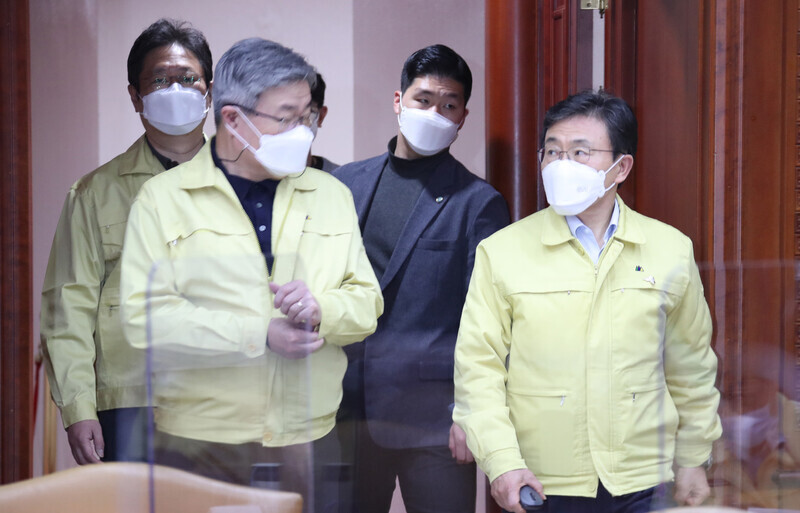hankyoreh
Links to other country sites 다른 나라 사이트 링크
KMA uses COVID-19 as bargaining chip against legal amendment to revoke convicted physicians’ licenses

The Korea Medical Association (KMA) is threatening to halt cooperation with COVID-19 vaccinations to protest a possible amendment to the Medical Service Act.
The amendment, which would allow for revoking the licenses of physicians convicted of crimes carrying prison sentences, recently passed a review by the National Assembly Health & Welfare Committee.
But with similar terms applied to attorneys and other professionals, some observers argue that there is no basis for making healthcare professionals the only exception.
“If the amendment is approved by the National Assembly Legislation and Judiciary Committee, the system of cooperation on COVID-19 treatment and vaccinations will collapse,” KMA President Choi Dae-zip predicted on Feb. 21 at a second meeting of the joint physician-government COVID-19 vaccination committee.
The day before, the chairs of 16 metropolitan and provincial KMA branches had released a statement warning, “If the amendment is approved by the National Assembly Legislation and Judiciary Committee, we will launch a full-scale battle, including a general strike by physicians nationwide.”
On Feb. 19, the Health and Welfare Committee voted on bipartisan lines to approve the Medical Service Act amendment, which would extend the grounds for revoking physician licenses from its current standards — which include drug addiction, incompetency and license lending — to cases where individuals are convicted of crimes carrying prison sentences or harsher penalties.
The aim of the amendment is to restore the grounds for license revocation prior to their drastic reduction in a Medical Service Act amendment in 2000. Attorneys, chartered accountants and other professionals also face decertification and periods of suspension when convicted of crimes involving prison sentences.
But the amendment also allows license revocation to be waived in cases of accidental homicide and other acts committed in the course of medical activities, even when they carry prison sentences.
At a meeting of the Central Disaster and Safety Countermeasures Headquarters (CDSCH) on Feb. 21, Prime Minister Chung Sye-kyun said, “The interests of a particular profession cannot be placed above the lives and safety of the public.”
“If this is used as an excuse for illegal collective action, the government plans to respond sternly,” he added.
Appearing the same day on KBS, Minister of Health and Welfare Kwon Deok-cheol explained, “Over the five years from 2016 to 2020, an average of 30 to 40 [physicians] per year have received prison sentences or harsher punishments for severe crimes.”
He went to say the amendment was being pursued “in the interest of the public’s lives and safety, and to protect the majority of healthcare professionals from the very small minority who commit serious crimes.”
Kim Sung-joo, a Democratic Party lawmaker who serves as the Health and Welfare Committee’s secretary, said, “It’s only physicians who are able to treat patients without any restrictions even after [being convicted of] murder, violent crimes or sexual crimes.”
“Our aim is to avoid imposing excessive restrictions while correcting what may come across as special treatment compared with other professions,” he explained.
By Choi Ha-yan, staff reporter
Please direct comments or questions to [english@hani.co.kr]

Editorial・opinion
![[Column] Season 2 of special prosecutor probe may be coming to Korea soon [Column] Season 2 of special prosecutor probe may be coming to Korea soon](https://flexible.img.hani.co.kr/flexible/normal/500/300/imgdb/original/2024/0426/3317141030699447.jpg) [Column] Season 2 of special prosecutor probe may be coming to Korea soon
[Column] Season 2 of special prosecutor probe may be coming to Korea soon![[Column] Park Geun-hye déjà vu in Yoon Suk-yeol [Column] Park Geun-hye déjà vu in Yoon Suk-yeol](https://flexible.img.hani.co.kr/flexible/normal/500/300/imgdb/original/2024/0424/651713945113788.jpg) [Column] Park Geun-hye déjà vu in Yoon Suk-yeol
[Column] Park Geun-hye déjà vu in Yoon Suk-yeol- [Editorial] New weight of N. Korea’s nuclear threats makes dialogue all the more urgent
- [Guest essay] The real reason Korea’s new right wants to dub Rhee a founding father
- [Column] ‘Choson’: Is it time we start referring to N. Korea in its own terms?
- [Editorial] Japan’s rewriting of history with Korea has gone too far
- [Column] The president’s questionable capacity for dialogue
- [Column] Are chaebol firms just pizza pies for families to divvy up as they please?
- [Column] Has Korea, too, crossed the Rubicon on China?
- [Correspondent’s column] In Japan’s alliance with US, echoes of its past alliances with UK
Most viewed articles
- 1Is Japan about to snatch control of Line messenger from Korea’s Naver?
- 2‘We must say no’: Seoul defense chief on Korean, USFK involvement in hypothetical Taiwan crisis
- 3[News analysis] Using lure of fame, K-entertainment agency bigwigs sexually prey on young trainees
- 4[Column] Park Geun-hye déjà vu in Yoon Suk-yeol
- 5Will NewJeans end up collateral damage in internal feud at K-pop juggernaut Hybe?
- 6Up-and-coming Indonesian group StarBe spills what it learned during K-pop training in Seoul
- 7[Column] Season 2 of special prosecutor probe may be coming to Korea soon
- 8Korea’s 1.3% growth in Q1 signals ‘textbook’ return to growth, says government
- 9Report reveals toxic pollution at numerous USFK bases
- 10[Editorial] Statue should not be central concern of comfort women issue